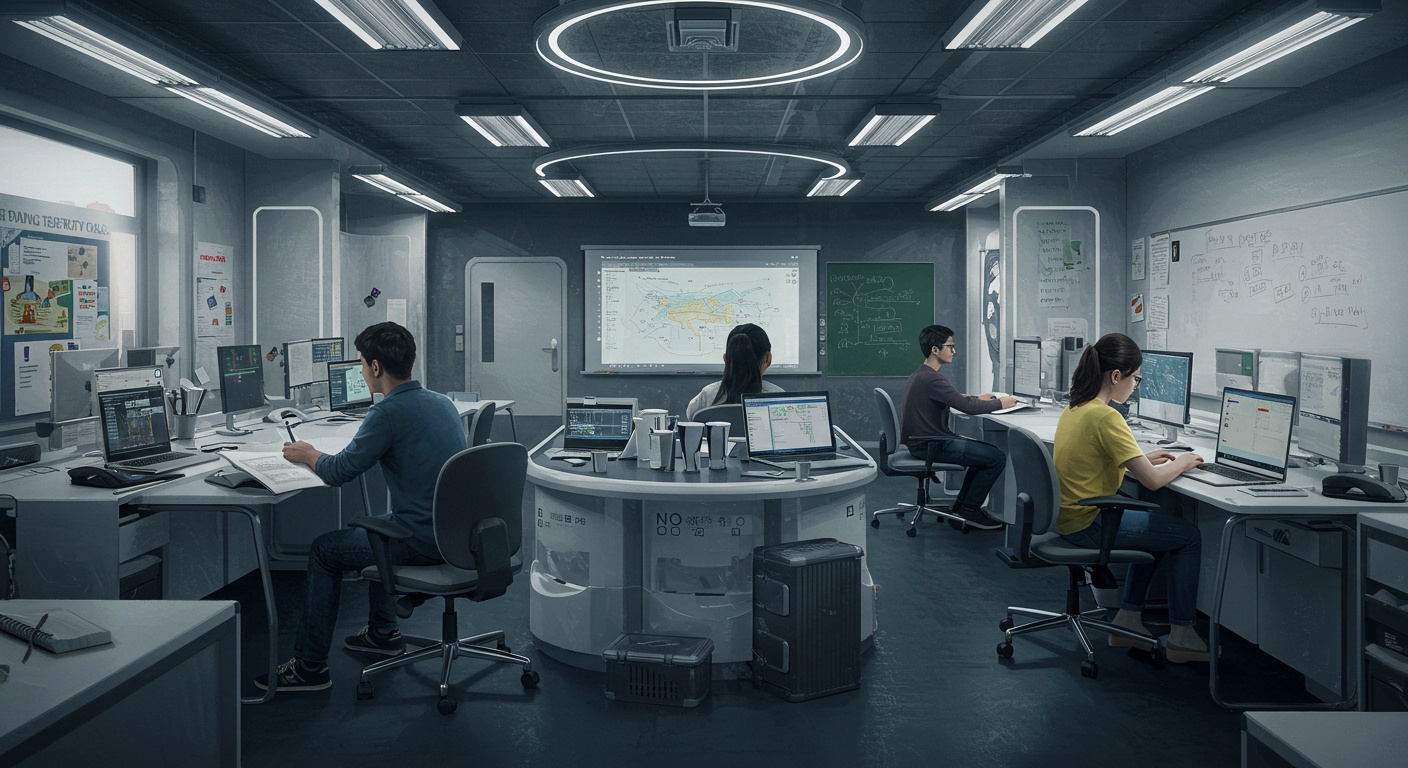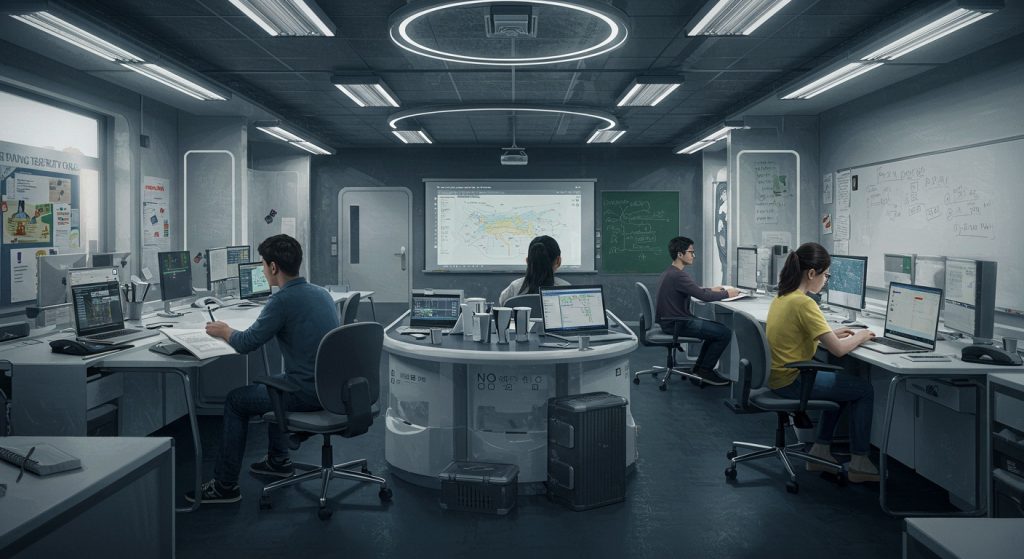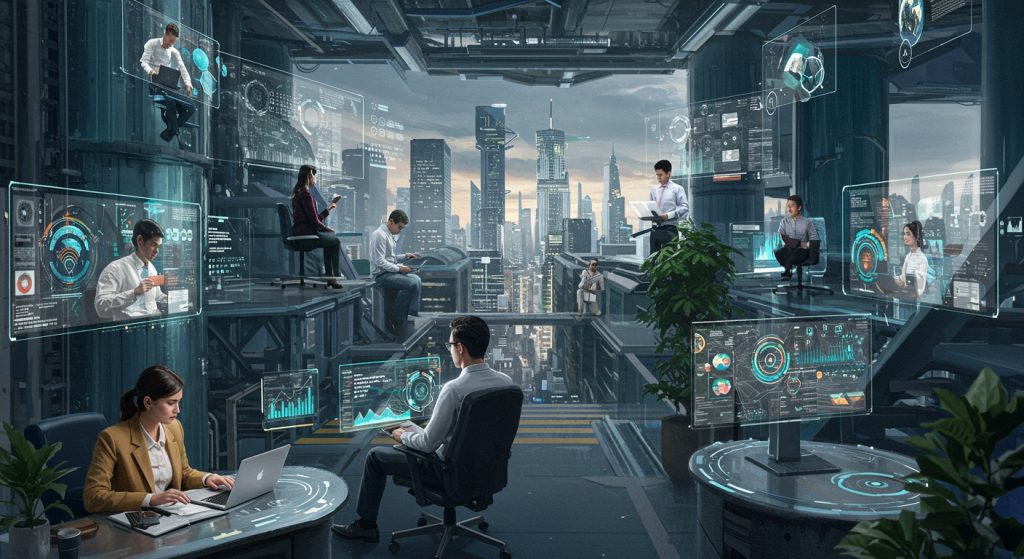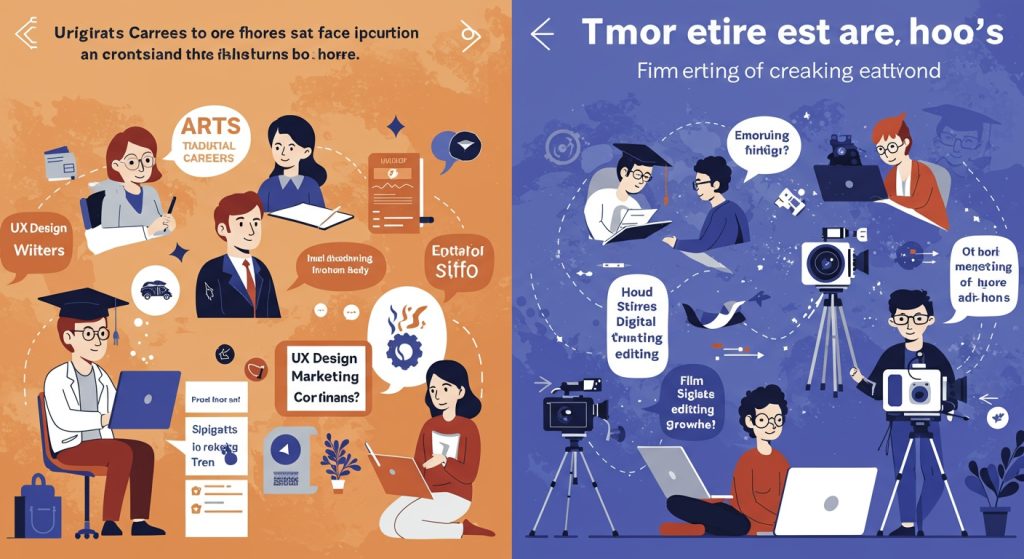The tech landscape is evolving at warp speed, demanding new skillsets beyond traditional software development. We see AI-driven roles surging, with demand for prompt engineers optimizing large language models like GPT-4 already eclipsing some classic coding jobs. Cybersecurity threats are also escalating, creating opportunities for specialized penetration testers and incident responders adept at thwarting sophisticated attacks. Meanwhile, the burgeoning metaverse is birthing roles like virtual world architects and immersive experience designers who can craft engaging digital environments using tools like Unity and Unreal Engine. This exploration unveils these emerging job roles awaiting BSc Computer Science graduates in 2025, providing insights into the skills needed to thrive in this dynamic future.

The Evolving Landscape of Computer Science Careers
The field of computer science is in constant flux, driven by rapid technological advancements. A BSc in Computer Science provides a strong foundation. Staying ahead requires understanding emerging trends. By 2025, certain specializations will be in high demand, reflecting the increasing importance of data, automation. Cybersecurity. This dynamic environment necessitates continuous learning and adaptation to thrive in future job roles. Career guidance is essential to navigate this complex landscape.
Artificial Intelligence and Machine Learning Engineer
Artificial Intelligence (AI) and Machine Learning (ML) are transforming industries. AI involves creating intelligent agents that can reason, learn. Act autonomously, while ML focuses on enabling systems to learn from data without explicit programming.
Key Technologies:
- TensorFlow: An open-source library developed by Google for numerical computation and large-scale machine learning.
- PyTorch: Another open-source machine learning framework known for its flexibility and ease of use, often favored in research.
- Scikit-learn: A Python library providing simple and efficient tools for data mining and data analysis.
- Cloud Platforms (AWS, Azure, GCP): Offering pre-trained AI services and infrastructure for deploying ML models.
Real-World Applications:
- Healthcare: Diagnosing diseases, personalizing treatment plans. Drug discovery.
- Finance: Fraud detection, algorithmic trading. Risk management.
- Retail: Personalized recommendations, inventory optimization. Customer service chatbots.
- Transportation: Self-driving cars, traffic management systems. Route optimization.
Required Skills:
- Strong programming skills (Python, Java, C++).
- Understanding of statistical modeling and machine learning algorithms.
- Experience with deep learning frameworks.
- Knowledge of data preprocessing and feature engineering.
- Ability to deploy and monitor ML models in production.
Data Scientist and Data Analyst
Data Science involves extracting knowledge and insights from data through various techniques, including statistics, machine learning. Data visualization. Data Analysts focus primarily on analyzing existing data to identify trends and patterns, while Data Scientists build predictive models and develop new analytical methods.
Key Technologies:
- Python: The dominant language for data science, with libraries like Pandas, NumPy. Matplotlib.
- R: A statistical computing language widely used for data analysis and visualization.
- SQL: Essential for querying and manipulating data in relational databases.
- Hadoop and Spark: For processing large datasets in distributed environments.
- Tableau and Power BI: For creating interactive data visualizations and dashboards.
Real-World Applications:
- Marketing: Customer segmentation, campaign optimization. Predictive analytics.
- Supply Chain: Demand forecasting, inventory management. Logistics optimization.
- Manufacturing: Predictive maintenance, quality control. Process optimization.
- E-commerce: Personalized product recommendations, fraud detection. Customer churn prediction.
Required Skills:
- Statistical analysis and data mining techniques.
- Experience with data visualization tools.
- Proficiency in SQL and database management.
- Knowledge of machine learning algorithms.
- Ability to communicate insights to stakeholders.
Cybersecurity Specialist
Cybersecurity is the practice of protecting computer systems, networks. Data from unauthorized access, theft. Damage. As cyber threats become more sophisticated, the demand for cybersecurity specialists continues to grow.
Key Technologies:
- SIEM (Security data and Event Management) Tools: Splunk, QRadar. ArcSight for real-time security monitoring and analysis.
- Intrusion Detection/Prevention Systems (IDS/IPS): Snort, Suricata. Bro for detecting and blocking malicious network traffic.
- Vulnerability Scanners: Nessus, OpenVAS. Qualys for identifying security weaknesses in systems and applications.
- Firewalls: Hardware and software firewalls for controlling network access.
- Endpoint Detection and Response (EDR) Tools: CrowdStrike, Carbon Black. SentinelOne for detecting and responding to threats on endpoints.
Real-World Applications:
- Financial Institutions: Protecting sensitive customer data and preventing fraud.
- Healthcare Organizations: Securing patient records and ensuring compliance with regulations like HIPAA.
- Government Agencies: Protecting critical infrastructure and national security.
- Technology Companies: Safeguarding intellectual property and preventing data breaches.
Required Skills:
- Knowledge of network security protocols and technologies.
- Understanding of common cyber threats and attack vectors.
- Experience with security tools and technologies.
- Ability to perform security audits and vulnerability assessments.
- Strong problem-solving and analytical skills.
Cloud Computing Architect
Cloud Computing involves delivering computing services—including servers, storage, databases, networking, software, analytics. Intelligence—over the Internet (“the cloud”) to offer faster innovation, flexible resources. Economies of scale. Cloud Architects are responsible for designing, building. Managing cloud infrastructure and services.
Key Technologies:
- AWS (Amazon Web Services): The leading cloud platform, offering a wide range of services.
- Azure (Microsoft Azure): Microsoft’s cloud platform, tightly integrated with Windows Server and other Microsoft products.
- GCP (Google Cloud Platform): Google’s cloud platform, known for its strengths in data analytics and machine learning.
- Containerization (Docker, Kubernetes): For packaging and deploying applications in containers.
- Infrastructure as Code (Terraform, CloudFormation): For automating the provisioning and management of cloud resources.
Real-World Applications:
- Startups: Scaling quickly and cost-effectively without investing in physical infrastructure.
- Enterprises: Migrating applications to the cloud to reduce costs and improve agility.
- E-commerce Companies: Handling peak traffic during sales events.
- Media Companies: Streaming video and audio content to a global audience.
Required Skills:
- Understanding of cloud computing concepts and technologies.
- Experience with cloud platforms (AWS, Azure, GCP).
- Knowledge of virtualization and containerization.
- Ability to design and implement cloud architectures.
- Strong problem-solving and troubleshooting skills.
Internet of Things (IoT) Developer
The Internet of Things (IoT) refers to the network of physical devices, vehicles, home appliances. Other items embedded with electronics, software, sensors. Connectivity which enables these objects to connect and exchange data. IoT Developers are responsible for designing, developing. Deploying IoT solutions.
Key Technologies:
- Embedded Systems: Microcontrollers (Arduino, Raspberry Pi) for building IoT devices.
- IoT Platforms: AWS IoT, Azure IoT Hub. Google Cloud IoT for managing and connecting IoT devices.
- Communication Protocols: MQTT, CoAP. LoRaWAN for enabling communication between devices.
- Data Analytics: For processing and analyzing data generated by IoT devices.
- Cloud Computing: For storing and processing large volumes of IoT data.
Real-World Applications:
- Smart Homes: Controlling lighting, temperature. Appliances remotely.
- Industrial Automation: Monitoring and optimizing manufacturing processes.
- Healthcare: Remote patient monitoring and telehealth.
- Agriculture: Precision farming and crop monitoring.
Required Skills:
- Experience with embedded systems programming.
- Knowledge of IoT protocols and technologies.
- Understanding of data analytics and machine learning.
- Ability to design and develop IoT solutions.
- Strong problem-solving and troubleshooting skills.
Blockchain Developer
Blockchain is a distributed, immutable ledger that records transactions in a secure and transparent manner. Blockchain Developers are responsible for designing, developing. Deploying blockchain-based applications.
Key Technologies:
- Blockchain Platforms: Ethereum, Hyperledger Fabric. Corda for building decentralized applications.
- Smart Contracts: Solidity, Vyper. Go for writing smart contracts.
- Consensus Algorithms: Proof-of-Work, Proof-of-Stake. Delegated Proof-of-Stake for validating transactions.
- Cryptography: Hashing algorithms, digital signatures. Encryption for securing data.
- Web3. Js and Truffle: For interacting with Ethereum-based applications.
Real-World Applications:
- Supply Chain Management: Tracking goods and materials throughout the supply chain.
- Financial Services: Secure and transparent financial transactions.
- Healthcare: Secure storage and sharing of patient data.
- Voting Systems: Secure and transparent voting processes.
Required Skills:
- Understanding of blockchain concepts and technologies.
- Experience with blockchain platforms and smart contracts.
- Knowledge of cryptography and security principles.
- Ability to design and develop blockchain-based applications.
- Strong problem-solving and analytical skills.
DevOps Engineer
DevOps is a set of practices that automates the processes between software development and IT teams, build, test. Release software faster and more reliably. DevOps Engineers are responsible for implementing and managing DevOps practices.
Key Technologies:
- Continuous Integration/Continuous Delivery (CI/CD): Jenkins, GitLab CI. CircleCI for automating the software build, test. Deployment process.
- Infrastructure as Code (IaC): Terraform, CloudFormation. Ansible for automating the provisioning and management of infrastructure.
- Containerization (Docker, Kubernetes): For packaging and deploying applications in containers.
- Monitoring Tools: Prometheus, Grafana. ELK Stack for monitoring system performance and application health.
- Configuration Management: Ansible, Chef. Puppet for automating the configuration and management of systems.
Real-World Applications:
- Web Applications: Deploying and managing web applications in the cloud.
- Mobile Applications: Automating the build, test. Deployment of mobile applications.
- Enterprise Applications: Improving the reliability and scalability of enterprise applications.
- Gaming Industry: Rapidly deploying and updating game servers.
Required Skills:
- Understanding of DevOps principles and practices.
- Experience with CI/CD tools and technologies.
- Knowledge of infrastructure as code.
- Ability to automate software deployment and infrastructure management.
- Strong problem-solving and troubleshooting skills.
Extended Reality (XR) Developer
Extended Reality (XR) is an umbrella term encompassing Augmented Reality (AR), Virtual Reality (VR). Mixed Reality (MR). AR overlays digital content onto the real world, VR creates immersive digital environments. MR blends the real and virtual worlds. XR Developers are responsible for designing, developing. Deploying XR applications.
Key Technologies:
- AR/VR Platforms: Unity, Unreal Engine. ARKit/ARCore for building XR applications.
- 3D Modeling Tools: Blender, Maya. 3ds Max for creating 3D models.
- Motion Tracking: Sensors and cameras for tracking user movements.
- Rendering Engines: For rendering realistic graphics and visuals.
- XR Headsets: Oculus, HTC Vive. Microsoft HoloLens for experiencing XR applications.
Real-World Applications:
- Gaming and Entertainment: Immersive gaming experiences and virtual tours.
- Education and Training: Virtual simulations for training and education.
- Healthcare: Surgical simulations and remote patient care.
- Retail: Virtual try-on experiences and product visualization.
Required Skills:
- Experience with AR/VR platforms and tools.
- Knowledge of 3D modeling and animation.
- Understanding of human-computer interaction.
- Ability to design and develop XR applications.
- Strong problem-solving and creative skills.
Comparison of AR, VR. MR:
| Feature | Augmented Reality (AR) | Virtual Reality (VR) | Mixed Reality (MR) |
|---|---|---|---|
| Environment | Overlays digital content onto the real world | Creates immersive digital environments | Blends the real and virtual worlds |
| Interaction | Limited interaction with digital content | Full interaction within the virtual environment | Interaction with both real and virtual objects |
| Hardware | Smartphones, tablets, AR glasses | VR headsets | MR headsets |
| Use Cases | Gaming, retail, navigation | Gaming, training, simulations | Design, healthcare, remote collaboration |
Low-Code/No-Code Developer
Low-Code/No-Code development platforms enable developers and non-developers to create applications with minimal or no coding required. These platforms provide visual development environments and pre-built components, allowing users to rapidly build and deploy applications.
Key Technologies:
- Low-Code Platforms: Mendix, OutSystems. Appian for building enterprise-grade applications.
- No-Code Platforms: Bubble, Webflow. Adalo for building web and mobile applications without coding.
- Integration Tools: Zapier and IFTTT for connecting different applications and services.
- Database Platforms: Airtable and Google Sheets for storing and managing data.
- Automation Tools: Power Automate and Integromat for automating workflows.
Real-World Applications:
- Business Process Automation: Automating repetitive tasks and workflows.
- Web and Mobile Applications: Building web and mobile applications quickly and easily.
- Customer Relationship Management (CRM): Managing customer data and interactions.
- E-commerce Platforms: Building online stores and managing product catalogs.
Required Skills:
- Understanding of low-code/no-code development principles.
- Experience with low-code/no-code platforms and tools.
- Knowledge of business process automation.
- Ability to design and build applications without coding.
- Strong problem-solving and analytical skills.
Quantum Computing Specialist
Quantum computing is a type of computing that uses quantum mechanics principles to solve complex problems that are beyond the capabilities of classical computers. Quantum Computing Specialists are responsible for developing quantum algorithms and software.
Key Technologies:
- Quantum Computing Platforms: IBM Quantum Experience, Google Cirq. Microsoft Q
for developing and running quantum algorithms.
- Quantum Programming Languages: Qiskit, Cirq. Q
for writing quantum code.
- Quantum Algorithms: Shor’s algorithm, Grover’s algorithm. Quantum Fourier Transform for solving specific problems.
- Quantum Simulation: Simulating quantum systems on classical computers.
- Quantum Hardware: Superconducting qubits, trapped ions. Topological qubits.
Real-World Applications:
- Drug Discovery: Simulating molecular interactions to develop new drugs.
- Materials Science: Designing new materials with specific properties.
- Financial Modeling: Optimizing investment portfolios and managing risk.
- Cryptography: Breaking existing encryption algorithms and developing new quantum-resistant cryptography.
Required Skills:
- Understanding of quantum mechanics principles.
- Experience with quantum computing platforms and programming languages.
- Knowledge of quantum algorithms.
- Ability to design and develop quantum software.
- Strong mathematical and analytical skills.
Career guidance in emerging technologies is crucial for navigating this complex field and identifying the right career path.
Conclusion
The future for BSc Computer Science graduates in 2025 is undeniably bright, brimming with opportunities in roles we’ve only just begun to define. As we’ve explored, fields like AI, cybersecurity. Data science are not just buzzwords. Rapidly expanding domains craving skilled professionals. To truly thrive, consider this your success blueprint. First, continuously update your skills. The tech landscape evolves rapidly, so embrace lifelong learning through online courses, certifications. Personal projects. Second, network strategically. Attend industry events, connect with professionals on LinkedIn. Build relationships that can open doors. Finally, don’t be afraid to specialize. Identify an area that genuinely excites you and become an expert. Remember, success isn’t just about landing a job; it’s about crafting a career you’re passionate about. With dedication and a proactive approach, you can not only navigate the future but shape it. Embrace the challenge. The possibilities are limitless.
More Articles
IIT Bombay: How AI Is Shaping The Future Of Engineering Degrees
Future-Proof Your Career: Options After BSc in Computer Science
BSc Computer Science Careers: Exciting Options For Future Graduates
Top Careers With Little Training: Find Low Fee High Paying Jobs
FAQs
So, I’m graduating with a BSc in Computer Science in 2025. What kind of cool jobs should I be looking at that might not even be huge now?
That’s the million-dollar question, right? Think beyond the usual software engineer. You’ll want to explore areas like AI Ethics Officer (making sure AI is fair and unbiased), Quantum Computing Developer (if you’re into super-powerful processing), Extended Reality (XR) Experience Designer (creating immersive virtual and augmented worlds). Maybe even a Bioinformatician (coding for biological data analysis!). These roles are all projected to grow massively.
AI Ethics Officer? What does someone in that job actually DO?
Good question! , they’re the conscience of AI. They develop guidelines and frameworks to ensure AI systems are fair, transparent. Don’t perpetuate biases. They’d be involved in everything from algorithm auditing to advocating for responsible AI development within a company.
Quantum Computing Developer sounds super futuristic. Is that REALLY a viable job option so soon?
It’s definitely cutting-edge. It’s still early days. But, major companies and research institutions are pouring money into quantum computing. While it might not be your first job out of college, having skills in quantum algorithms and programming (even theoretical knowledge) will make you a hot commodity in the coming years. Think of it as a long-term play.
Okay, XR Experience Designer… That sounds fun! What skills are needed for that?
It IS fun! You’d need a mix of technical and creative skills. Think programming (C#, Unity, Unreal Engine), 3D modeling, user interface/user experience (UI/UX) design. A good understanding of storytelling and human-computer interaction. , you’re building immersive experiences, so you need to know how to make them engaging and intuitive.
Bioinformatician… That’s computer science and biology? What kind of CS skills are most crucial there?
Exactly! It’s a fascinating intersection. Key CS skills include proficiency in programming languages like Python and R (for statistical analysis), experience with databases (managing large biological datasets). A solid understanding of algorithms and data structures. Bonus points for knowledge of machine learning and bioinformatics tools.
Are these roles going to pay well? I gotta pay off these student loans!
Generally, yes! These emerging roles are often highly specialized and require advanced skills, which translates to higher salaries. Keep in mind that compensation will vary depending on the company, location. Your experience level. The potential for growth is significant.
How can I prepare myself now for these future job roles while I’m still in school?
Great question! Focus on building a strong foundation in core computer science principles. Then, take relevant elective courses, participate in research projects, contribute to open-source projects. Consider internships in the areas that interest you most. Networking is also crucial – attend industry events and connect with professionals in these fields.



